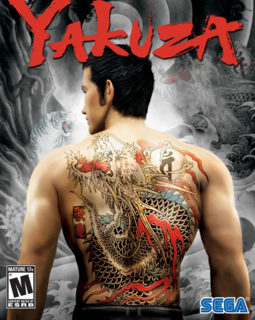Blood on the streets of Tokyo.
Your role in the game is that of Kazuma Kiryu, a disgraced former-Yakuza sent to jail for seemingly murdering his ‘Oyabun’ or family boss. The plot takes numerous twists and turns from the moment that Kazuma is released from prison, with sub-plots including looking after a homeless girl found wandering the streets of Tokyo, the disappearance of 10 billion yen from the family funds, and the continuing power struggle at the top of the Tojo Yakuza syndicate. Kazuma winds up intertwined in all of the events, and as you can probably guess, its left up to you to fight your way out for the most part.
The game structure in Yakuza is a hybrid of most of the staple Japanese gaming genres, which probably explains the sales figures on that side of the planet. Initially the player is presented with a free-roaming section of Tokyo, complete with numerous missions to undertake, shops to visit, restaurants to eat at and secrets to discover. Story missions are highlighted on the rather disorienting map and can be undertaken at leisure, the game rarely presses you to complete any particular goals, but the nature of the story means this will be where most players will focus. Yakuza definitely rewards exploration of the environment, and some of the best gameplay rewards can come from the side-missions and attractions to be found outside the main story arc.
The majority of the action occurs in either random street battles or plot-driven fight sequences, which gain Kazuma experience points according to how well you dispatch the numerous foes on offer. Efficient use of finishing moves reward the player with extra points, which in turn contribute to levelling up various skills and movesets. A game with such an emphasis on combat lives or dies by its fighting system, and for the most part this is a mixed bag. Some may dislike the levelling mechanic, as the start of the game can feel sluggish and unrewarding as a result. Combat only really shines once the story reaches 4-5 hours of playtime, by which point Kazuma has an expanded moveset and can dispatch enemies in a variety of nasty and satisfying ways. There is a rather weak lock-on system in place, but once you get your head around the nuances of this and the blocking and dodging mechanic, it can be an immensely cathartic experience to dispatch a group of enemies with efficiency.
The visual quality throughout the game is generally excellent, with highly stylised characters and a sometimes bone-crunching animation system that lends weight to the action, in particularly some of the finishing moves, which are wince-inducing. The streets of Tokyo are rendered remarkably well by the aging PS2 hardware, and tie-ins with well-known Japanese brands lend the visuals an aura of authenticity that few games can match at present. The western version of Yakuza also has somewhat of an all-star voiceover cast, although these are generally hit and miss in terms of quality. Mark Hamill and Michael Madsen give particularly good performances, whilst Eliza Dushku should hang her head in shame, delivering her lines with seemingly no interest at all. By far the best performance here comes from Bill Farmer, who some of you may remember as Sam from the original Lucasarts Sam and Max game. I guess that shows that sometimes experience in videogame work rather than looking pretty should count more than anything.
Ultimately the story in Yakuza carries the experience along, and it was a credit to the game that I couldn’t wait to get through the next fight sequence to see what plot twists and turns would result. The dialogue is of a very adult nature, but rarely seems out of context for the sometimes clichéd characterisations on offer. In this age it’s a pleasure to play a game that puts the plot above all else and largely succeeds. Whilst the slow pace at the start of the game can be justly criticised, given time Yakuza is an immensely rewarding experience that any fan of crime movies, fighting games or Japanese pop-culture should check out.

